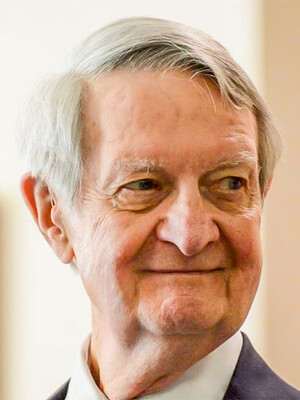
Wayne Atherton Meeks, Woolsey Professor of Biblical Studies, Emeritus, an influential scholar who helped shape contemporary New Testament and Early Christian studies, died on Jan. 10 at Yale New Haven Hospital. He was 91.
Meeks had broad expertise in the origins of Christianity and interpreting the New Testament. He was one of the foremost authorities on the social world of the Apostle Paul, on the Fourth Gospel, and on the formation of Christian morality.
His book “The First Urban Christians: The Social World of the Apostle Paul” (1983) received the Biblical Archeological Review Award for Best Book on the New Testament, and the American Academy of Religion Award. In 2009, the Society of Biblical Literature held a session dedicated to exploring the impact of this book on the field 25 years after its publication.
Among his other books are “The Moral World of the First Christians” (1986) and “The Origins of Christian Morality: The First Two Centuries” (1993), which was named the “best new book” in philosophy and religion by the American Association of Publishers. He was a consultant and interviewee for two widely-viewed PBS television series — “The Kingdom of David: The Saga of the Israelites” (2003) and “From Jesus to Christ” (1998).
On hearing of Meeks’ death, John Barclay, the Lightfoot Professor of Divinity at Durham University, remembered him as “an utterly brilliant scholar — careful, creative, ground-breaking, and deeply intelligent. He is for me in a class of a tiny number of top New Testament scholars of all time. His ability to write beautiful, crafted prose was a sign of his cultivated, clear mind, and his cultural reference points were wide and deep.”
Dean Béchard, S.J., Professor of New Testament Studies at the Pontifical Biblical Institute in Rome, noted also that he was the guide to many doctoral students, “to whom I strive to pass on, in some measure, what I received from Meeks in great abundance: the capacity to read carefully and broadly, the courage to ask new questions, the discipline needed to search for valid answers, and an abiding respect for those who see things differently.”
Meeks was born in Aliceville, Alabama, and received his B.S. in physics from the University of Alabama, and his B.D. from Austin Theological Seminary in Texas. Before coming to Yale for graduate study he was a university pastor in Memphis, Tennessee.
Experiences as a southerner — what he kept and what he left behind — propelled Meeks and informed his investigation of faith and morality. Awareness of the contradictions inherent in the Southern racial divide that existed alongside intimacy between races in everyday life led him to probe and question Christian ethics rather than simply represent them. The stark contradictions of Southern gentility and racial violence propelled his sense of justice and of responsibility for just action. In a chapter entitled “The Irony of Grace” (2002), he connected the irony found in these contradictions — contradictions he also found in Christian doctrine — and what he labeled “faith’s ironies,” ironies that motivated his sociological rethinking of the origins of early Christian morality.
After earning his Yale Ph.D., he taught briefly at Dartmouth College and Indiana University before returning to Yale in 1969. During his long tenure, he was both chair of the Department of Religious Studies and director of the Division of the Humanities. In 1999 he was the chair of a special committee of 10 distinguished faculty members who established the regulations for the now successful Koerner Center for Retired Faculty.
He served as president of the Society of Biblical Literature and Studiorum Novi Testamenti Societas (SNTS). He held an honorary doctorate from the University of Uppsala and was a corresponding fellow of the British Academy and a fellow of the American Academy of Arts and Sciences. In 2004 he received the prized Yale Phi Beta Kappa DeVane Medal for teaching and scholarship.
Kai Erikson, the William R. Kenan, Jr. Professor of Sociology and American Studies, Emeritus offered the following tribute:
“Obituaries have a way of focusing on the careers of brilliant scholars who contribute in important ways to public knowledge. No one deserves that more than Wayne Meeks. But many of us who felt close to him will want to focus on him as a person, a human being.
“Wayne and I were members of a group of aging academics who met regularly to share thoughts and feelings with one another. Wayne surprised us one day when he announced, with a broad smile, ‘I am not a believer.’
“We took him to mean that the myths circulating in early Christianity were not always accurate and that there may not have been angels residing in a distant heaven overhead or devils plotting deep underneath the surface of the earth. But he knew the ways and teachings of Jesus and respected them without a trace of flourish or pronouncement. His was a life of sheer decency — offering a gentle kindness to, taking close care of, showing respect for, teaching softly, and just plain loving.”
Meeks’ first wife, Martha Fowler Meeks, died in 1996, and his brothers, Kenyon and Rufus Meeks, also predeceased him. He is survived by his second wife of 23 years, Judith Colton, Professor of the History of Art, Emerita; by his daughters, Suzanne Meeks (Russell Vandenbroucke), Edith Meeks (Peter Coston), and Ellen Meeks (Kevin McCarty); grand-daughter Elena Meeks (Kevin Laskee); and great-grandsons Vincent Meeks and Vaughn Laskee. There will be a private interment followed by a memorial service to be held at a later date.